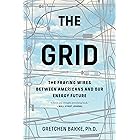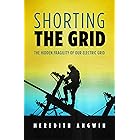| Digital List Price: | $22.99 |
| Kindle Price: | $12.78 Save $10.21 (44%) |
| Sold by: | Amazon.com Services LLC |
Your Memberships & Subscriptions

Download the free Kindle app and start reading Kindle books instantly on your smartphone, tablet, or computer - no Kindle device required.
Read instantly on your browser with Kindle for Web.
Using your mobile phone camera - scan the code below and download the Kindle app.

OK
The Grid: A Journey Through the Heart of Our Electrified World Kindle Edition
Named the greatest engineering achievement of the 20th century by the National Academy of Engineering, the electrical grid is the largest industrial investment in the history of humankind. It reaches into your home, snakes its way to your bedroom, and climbs right up into the lamp next to your pillow. At times, it almost seems alive, like some enormous circulatory system that pumps life to big cities and the most remote rural areas.
Constructed of intricately interdependent components, the grid operates on a rapidly shrinking margin for error. Things can—and do—go wrong in this system, no matter how many preventive steps we take. Just look at the colossal 2003 blackout, when 50 million Americans lost power due to a simple error at a power plant in Ohio; or the one a month later, which blacked out 57 million Italians. And these two combined don't even compare to the 2001 outage in India, which affected 226 million people.
The Grid is the first history of the electrical grid intended for general readers, and it comes at a time when we badly need such a guide. As we get more and more dependent on electricity to perform even the most mundane daily tasks, the grid's inevitable shortcomings will take a toll on populations around the globe. At a moment when energy issues loom large on the nation's agenda and our hunger for electricity grows, The Grid is as timely as it is compelling.
- ISBN-13978-0309102605
- PublisherJoseph Henry Press
- Publication dateFebruary 20, 2007
- LanguageEnglish
- File size1058 KB
Customers who bought this item also bought
Editorial Reviews
From Publishers Weekly
Copyright © Reed Business Information, a division of Reed Elsevier Inc. All rights reserved.
Review
"This is the first book to describe the remarkable history of a hidden matrix that rules the industrialized world, is invisible when it is working, and is taken for granted by almost everyone who uses it. Anyone who has ever wondered what happens when you plug a toaster into an electrical outlet will find this book as illuminating as the billions of lights the grid powers every day. As energy demands continue to rise in political significance, general readers will find the perspective offered by this book particularly useful." -- Lawrence M. Krauss, author of The Physics of Star Trek, and, Hiding in the Mirror
"This wonderfully written story of the electricity industry's remarkable history is a prerequisite for understanding its challenges and opportunities today... a very fun read." -- Amory B. Lovins, CEO, Rocky Mountain Institute
"What Thoreau did for Walden Pond, Schewe has done for The Grid. At last, a subject too often chronicled by dry institutional histories has found its bard. It's fun to read and vividly told." -- Keay Davidson, author of Carl Sagan: A Life
"The Grid is the most complex machine ever built and it has had the greatest impact on our quality of life of any technological advancement. Yet, few people understand the Grid and recognize it as the power delivery system that brings electricity to our homes and businesses. Phillip Schewe does a masterful job of recounting the Grid's history and some of the many challenges it now faces." -- Clark Gellings, Vice President, Innovation Electric Power Research Institute
From the Publisher
Named the greatest engineering achievement of the 20th century by the National Academy of Engineering, the electrical grid is the largest industrial investment in the history of humankind. It reaches into your home, snakes its way to your bedroom, and climbs right up into the lamp next to your pillow. Relying on a sort of NATO alliance of utilities pledged to help each other in time of need, vast amounts of invisible resources are moved and exchanged on a second's notice. At times, the grid almost seems alive, like some enormous circulatory system that pumps life to big cities and the most remote rural areas.
Constructed of intricately interdependent components, it operates on a rapidly shrinking margin for error. Things can - and do - go wrong in this system and no matter how many preventive steps we take are, failure is inevitable. Just look at the colossal 2003 blackout, when 50 million Americans lost power due to a simple error at a power plant in Ohio; or a month later when 57 million Italians woke up without cappuccino. Still, these two combined don't even compare to the outage in 2001 that affected 226 million people in India.
As we get more and more dependent on electricity to perform even the most mundane daily tasks - from infrared urinals and sinks to automatic doors - the grid's inevitable shortcomings will take a toll on populations around the globe. As energy issues loom large on the nation's agenda and our hunger for electricity only grows, The Grid is as timely as it is compelling.
About the Author
Product details
- ASIN : B004S79OSA
- Publisher : Joseph Henry Press (February 20, 2007)
- Publication date : February 20, 2007
- Language : English
- File size : 1058 KB
- Text-to-Speech : Enabled
- Screen Reader : Supported
- Enhanced typesetting : Enabled
- X-Ray : Not Enabled
- Word Wise : Enabled
- Sticky notes : On Kindle Scribe
- Print length : 318 pages
- Best Sellers Rank: #1,704,288 in Kindle Store (See Top 100 in Kindle Store)
- #217 in Electromagnetism (Kindle Store)
- #269 in Physics of Energy
- #453 in Physics of Electricity
- Customer Reviews:
About the author

Discover more of the author’s books, see similar authors, read author blogs and more
Customer reviews
Customer Reviews, including Product Star Ratings help customers to learn more about the product and decide whether it is the right product for them.
To calculate the overall star rating and percentage breakdown by star, we don’t use a simple average. Instead, our system considers things like how recent a review is and if the reviewer bought the item on Amazon. It also analyzed reviews to verify trustworthiness.
Learn more how customers reviews work on Amazon-
Top reviews
Top reviews from the United States
There was a problem filtering reviews right now. Please try again later.
Schewe's book will enlighten you with facts you never considered. You'll discover just where the energy that lights your home originates. You'll discover that much of the electrification of North America was and is conducted by private enterprise. Government sponsored projects such as TVA and Hoover Dam have played major roles.
If you think this book might not interest you, think again! Within the first few pages you'll find it interesting. After the first chapter you'll take it to work with you. It's good material for conversation and to fill your ever growing quest for knowledge.
I have found a few instances where I would have changed the wording for clarity... but that's just my opinion and does not detract from the overall message.
As a historical survey, this book is generally interesting and informative. In fact, the coverage of the 1965 Northeast power outage is pretty gripping. The section on the TVA was also quite interesting.
Even the best parts though are marred by the author's overly enthusiastic writing style. Sometimes it works, but in general, he uses too many rhetorical questions and too many "cutesy" comparisons and descriptions. It often feels like he is talking to a class of third graders.
I felt the book really lost steam in the later chapters with too much reverence for Amory Lovins and excessive emphasis on "green" initiatives.
Overall, the book is an easy and informative read, but certainly not great. And finally, don"t expect to learn much about what the grid is or how it (or electricity itself) actually works.
Although the author himself points out that it would be impossible to put the entire history of electricity into a single volume, he does a wonderful job of beginning with the basics and explaining them so anybody can understand the subject. From the initial small grid on Pearl Street in New York to today's mammoth interconnected grids covering huge areas, the book examines and reflects on how it was built and how it operates in the world then and today.
We start the look at the grid in the middle of the black out that struck the East Coast in 2003 and then revert back to the beginning with Edison. Following Edison comes, Tesla, Westinghouse, Insull, Lilienthal and every other major player in electricity to current time. The author also covers all of the major events and a few less major ones as well. He even has a side trip to Russia during Lenin's time to examine how the grid was formed under Communist rule.
The book is fascinating in content and wonderfully written. The author has a unique ability to describe otherwise boring information and make it come alive. He also has an interesting sense of humor, and plants his tongue firmly in his cheek on more than one occasion. This book is history at its best, and I look forward to reading more of the work of this author. This is highly recommended for all!
I have learned, as an author, how to use the interview technique to introduce new concepts. Thank you!











